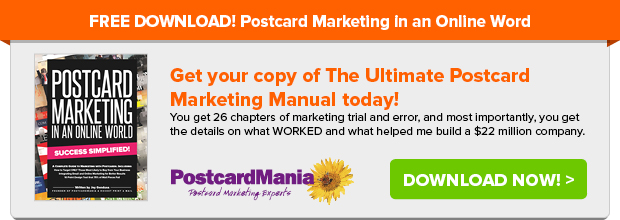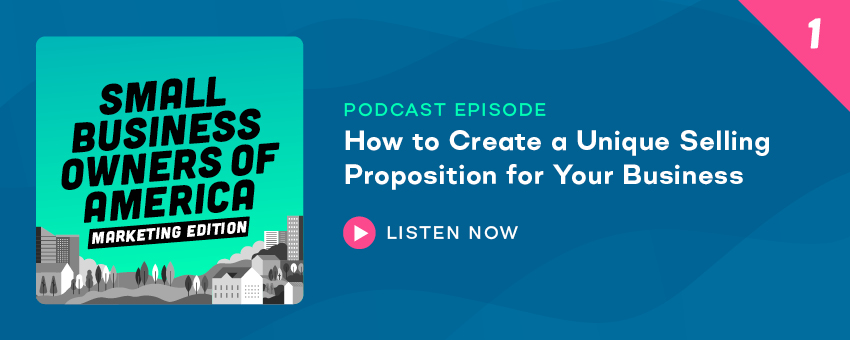How to Create a Unique Selling Proposition for Your Business (Podcast Episode)
Updated on December 13, 2021We’re incredibly excited to roll out our new podcast series, Small Business Owners of America -Marketing Edition! Its goal is the same as my newsletter series — to provide small business owners with marketing advice that anyone can understand and apply to their company.
This week I’m sharing what truly makes a small business stand out from their competition.
If you’ve been following my content, you know I’m HUGE on identifying your business’s unique selling point and putting it at the forefront of your marketing.
In marketing, we call this the unique selling proposition (USP) — and its meaning in business cannot be understated. To give a short definition, it’s the central attribute that differentiates your business’s product or service against others in the same industry, usually identifying a distinctive benefit.
In our first-ever podcast episode, I dive into what a good USP looks like, how to figure out what yours is, and some of the best examples that I’ve seen.
It’s a fast and easy listen. Check it out!
You can also listen to this podcast on Apple Podcasts, Buzzsprout, Spotify, and PlayerFM! Subscribe to get notifications for future episodes!
Here’s the transcription below of today’s episode, a conversation between our Director of Multimedia Content, Peyton Breault, and myself:
Note: This transcription has been edited slightly for clarity.
“Today, we’re going to talk about how to stand out from the competition with a unique selling proposition.”
Peyton: Today, we’re going to talk about competition and how to stand out. Now, we see an absurd amount of ads from different brands every single day — digital marketing experts estimate that most Americans are exposed to around 4,000 to 10,000 ads each day. How do some brands stand out among the rest?
I want you to think about the last branded item you bought. Why did you buy it? Why did you choose that specific brand over other brands? Maybe it’s something you’ve just always bought, or maybe it’s something you didn’t give any thought to, and you bought it because it was on sale. Or, you bought the product because you truly believed and thought it was better than its competitors.
For me, my last small business purchase (because we love small businesses here) was a pumpkin bandana from this website called Boho and Bark for my little puppy. She has a ton of bandanas from different small businesses. But really, what stood out to me, or made this brand unique, was kind of the aesthetic of this bandana. It was very artsy, it was very neutral colored, I like the way it looked, and I read on their website that all their fabric is sourced from other artists and is screen-printed with eco-friendly dyes and cotton. Most of the bandanas the business owner made, she crafted with her dog sitting at her feet, so it was just a really unique aspect that lead to my purchase.
I actually did think about buying from another company, but this brand stood out to me. Now, not all purchases in life will be as simple as buying your dog a bandana. Some purchases take a lot of convincing. And if you’re a business owner, you really have to stand out amongst a ton of other competitors, and that’s what we’re going to talk about today: how to stand out amongst the rest; rather, how to be unique.
Alright, you’ve heard enough from me, so I want to turn this conversation over to a pro in the field of competition, research, and how to stand out amongst the rest.
Hi Joy!
So my first question for you is, can you break down how to stand out from the competition? Say I’m a small business owner, and there’s a ton of other owners (competition) in the area. How do I make myself unique?
Joy: Well, it’s a very good question. If you look at the number of realtors, the number of insurance brokers, the number of roofing companies, kitchen remodelers, there’s so many of the same kind of business in small areas, so it’s important to figure out a way to stand out from the competition. And really the only way you can do that is to know all about your competitors, you kind of have to see what all of their selling points are. So you need to go to all their websites, online shop them, and find out everything you possibly can about each one of them.
What will happen is you’ll learn things about each one, things that you really admire about those companies and things that you really think are terrible, and then you can sort of see what’s lacking in your own business and change the way you do things, for instance:
Let’s say you’re going to the doctor, an individual practice that carries your insurance. But, you go there and they make you wait half an hour past your appointment time. Wouldn’t it be interesting to be the only doctor that doesn’t make you wait? Their USP could be: “We honor our appointment time or the visit is free!” I know no doctor is ever going to do that, but that’s the point, is finding out what’s terrible about your competitors and sort of emphasizing that you guys don’t do that. That’s one way.
Peyton: So the first thing you should do if you really want to stand out, is go to Google, say I’m a realtor. I search for other realtors in my area, I look at their websites, determine what they offer and what houses they have, maybe what they’re lacking, and then I can pinpoint what makes me different?
Joy: Yeah. It’s harder with people who are selling themselves than it is when someone’s selling a business. Like with realtors, they offer the houses in the area, period. Some of them have a listing, some of them don’t. These houses are the ones for sale, these are the ones that are not for sale, and it’s sort of very black and white. So as a realtor, you probably have to really figure out how to differentiate yourself by maybe how long you’ve been in business.
If you’ve been in business a really long time, say you have the number of years you’ve been doing this as your experience. You have a ton of other clients and you can tout to that, which the top realtors do. They’ll say, “We’ve sold this much.” Now, when there’s a ton of realtors that are saying the same thing, they have to be more gimmicky than a business that has a product or a service where they have a big staff.
Same thing with an insurance broker; insurance is insurance and consumers can all shop all the different companies. So what makes you different? Why should I work with you? You really have to figure out how to sell yourself with realtors, insurance agents, and financial advisors where they’re the person, it’s a lot more of out-flowing their personality on social media. They require a lot more communication to differentiate themselves than someone who has a business, a product or service.
“In marketing, we call this characteristic the unique selling proposition (USP) — and its meaning in business cannot be understated.”
Peyton: That is such a good key point and key tip there, because not all of us are selling products or services. Sometimes we’re selling ourselves — why choose me as a person versus somebody else? Maybe I’m a family person; we do this business together, a mother and daughter team, something like that.
I have another question, other than just going on Google, are there other ways to research competition? I know you touched on it lightly, but is that the main way to research or is there somebody you can talk to or anyone that can help you with that?
Joy: Really the only way is to research is to go to the companies’ websites. PostcardMania seriously blind shops our competitors. We want to know what they’re charging for graphic design, what typographic design they’re giving for the money, what is the print quality like, etc.
So we actually spend the money and order the competitor’s product to check them out. Sometimes the product or service is a little too expensive for you to actually buy it, so you have to take it all the way ’til you don’t sign the contract.
So let’s say you’re a kitchen remodeler and you’re researching a competitor. You can go through the entire quoting process or have somebody do it for you if your competitor knows that you own another remodeling company nearby. So maybe you hire somebody to do the entire quoting process with your top five competitors and take copious notes on everything for you.
“The simple definition of a USP is what makes your marketing stand out amongst the rest of the other businesses.”
Peyton: We’re talking about what makes us stand out amongst the rest of the other businesses, and there is this term that we use… And again, on this podcast, we never want you to be confused, but some marketing companies use this term called Unique Selling Proposition.
Joy: A unique selling proposition is something that every business should have. It’s just the thing about your business that makes you unique, which would convince somebody to buy your product or service; it’s something exclusive that they can’t get from another business. They can’t get that unique selling proposition from your competitor.
And to just give you an example of that, when PostcardMania started, we were the only printer that was selling or manufacturing postcards that we sold directly to the small business owner. We didn’t really have any competitors for the price. I mean, you could go to any commercial printer, but we were doing it for like $389 for 5,000 full-color super glossy postcards. We didn’t have any competitors — your only option was to go to the commercial printer in your town, and it would cost you anywhere from $1,200 to $1,500.
So we had this incredible Unique Selling Proposition, but what happened is all the big printers, and when the internet came out, they all started coming up with a postcard website that would compete with us and they would just undercut our price. So suddenly we’re competing on price, and nobody wants to do that. That’s the worst. You never want to say, “The unique thing about me is I have the lowest price,” or, “The unique thing about me is I have the best customer service.” Because those things — anybody can say it, and anybody can just keep undercutting your prices. And who wants to be the cheapest? I don’t think anybody really wants to. So basically, we had to come up with something fresh, and it took a little bit of figuring out.
What we did is we figured out the thing that people hate the most about buying direct mail. The thing that they hate the most is that they’re not sure they’re going to get a good response; they hate that they’ve spent money on marketing in the past, and marketing has betrayed them after spending all this money. They have these high hopes and it betrayed them, so we thought about how can we combat that for them and make it something unusual that would differentiate us from our competitors.
So I hired a results manager, and that person went through all the campaigns and cataloged them so that we could have all the data on each of these campaigns by industry. We’d be able to sort of share that information with our prospects so that they don’t have to reinvent the wheel, right? So that was very unique and actually is still very unique to this day.
Even though we are super overt about it, we put it on our website, we tout it, and it’s part of our marketing, none of my competitors wanted to spend the money on a full-time salary to do that. It actually takes a lot of effort to do it, which is a good point as well because it does take effort to make yourself unique in a competitive field. You have to figure out what’s really going to be the thing that people hate about your industry, that you can now change completely, and that could turn you into a complete trend-setter and a cutting-edge business.
Peyton: So we’ve been talking about unique selling propositions and how you create one. Do brands need slogans? Do they need to have pictures? What are the key things that a company needs for these kind of unique selling propositions?
Joy: Well, once you figure out what you can do that’s super unique, you want to take that and use it in all of your marketing. So you want to be able to say that you’re the only one who does it, even if you’re not the only one in the country. You can say you’re the only one in your area, so you want to be exclusive at this thing that you’re doing. Like if you’re a realtor, you might be able to say, “I am the only realtor that has sold X number of properties in X number of days — I will get your property sold,” that kind of thing. You can come up with a line and you kind of use that as a tagline.
In terms of your branding, I wouldn’t say your unique selling proposition specifically has to do with your branding, but it does kind of go hand in hand with any campaign that you’re putting together. It makes you unique, it becomes part of your elevator pitch, you put it on your promo, you put it on your website, and you put it where anybody’s going to see anything about you just to differentiate yourself.
Peyton: So let’s say if I’m a dentist with the latest technology that makes a patient’s life better that I want to push that out everywhere, I want to say, “You can get this procedure done in half of the time,” making sure that you include saying that it’s just as safe. But, you don’t have to be here for an entire day, and you don’t have to waste your entire day for this one procedure because this is what we have.
Joy: Exactly.
Peyton: You pretty much answered almost all of the questions within that last answer, but my next question was going to be, how do I communicate my unique selling proposition to my target audience?
Joy: Well, honestly, your USP is hard to come up with it to begin with. And then once you come up with it, how do you make it concise, how do you make it into a one-liner? It’s not that easy. You can hire a copywriter, you can go to elancer.com to find a freelance copywriter or Fiverr.com to find a really expensive copywriter to help you with the project.
You can read this book, it’s called POP!: Create the Perfect Pitch, Title, and Tagline for Anything. The author is Sam Horn, and you can read that book and it can help you figure out how to take a sentence or paragraph and turn it into a little tagline.
Peyton: Just push the tagline out everywhere, whether you decide to do direct mail, or organic and paid social media, push it out anywhere. Okay, so honestly, I think we’ve covered a lot about how you or your business can start on the process of finding what makes you different from your competitors, or how to figure out how to do your unique selling proposition.
Joy: I mean, maybe I should give a couple more examples of USPs.
“Here are some industry examples of unique selling points…”
Peyton: I would love that, because there are so many industries that we service here at PostcardMania and that are out in the small business world.
Joy: Exactly, so an example would be, if you’re a roofer, you can guarantee that there will be no leaks. If you guarantee no leaks for a certain amount of time, or you’ll give a free roof for free, or at least you’ll patch it until the rest of eternity. These kind guarantees can definitely make you unique, because not everybody wants to give guarantees anymore.
Peyton: Which is so important here in Florida because it rains all the time. So that is like a guarantee that I am on board with.
Joy: Another example could be a pediatric dentist. If your child doesn’t leave the dentist happy, the appointment’s free and we won’t charge you. Okay, so what are you going to lose by offering that? Like $100 for your first time looking into the kid’s mouth? So you get the parents feeling great about coming in, and usually pediatric dentists know how to get kids calm; they can put on a movie or whatever.
Peyton: Is there anything else that you think the listeners should know about how to stand all against the competition? You gave us plenty of examples, but is there any one key takeaway or advice you can give?
Joy: I would say that the first thing to do is a really good competition study. Don’t start looking at innovating or coming up with something until you really know what all your competitors are doing and what they’re offering, because that will actually give you some ideas. Then you also want to list out all the features that you have about your business right now, like everything about your business, and it helps you if you put everything in writing, in that way you can sort of see it.
Peyton: So take a step back and look at it. Pros and cons. There’s probably a lot of just pros!
Joy: But there really are lots of both pros and cons! If you really look at your business and compare it to competitors, you will find things that you’ll want to fix in your own process, so the competition study is just very valuable.
Peyton: Right. What you can do, we may describe more details in another episode, but an easy way to do it automatically is there’s something called a Google Alert. You can set up a Google Alert on literally type of business or whatever you want, and you can make it as specific or broad as you would like.
You can say “digital marketing companies in Jacksonville, Florida”, and every day or every week, Google will give you an email of these links, what has been in the news, and who has been in the news. You can click on it and be like, “Oh, that’s a new company in my area, or this company is in the news. I wanna be in the news.”
Joy: You can also put in every name of every competitor that you know about and see if anything comes up on Google about them, like if they’ve made changes to their site, if they’ve made offers, if they’re doing any kind of promotion. You can see that too.
Peyton: So that’s just a little tip! So Joy, if anybody wants to talk to you or contact you, where can we find you?
Joy: Postcardmania.com? Yeah, that’s the easy way. They can email me at joy.gendusa@postcardmania.com as well. I love to hear from small business owners, I answer those emails myself, if you have any questions about anything. We have a lot of education at our website as well.
Peyton: Be sure to follow us on social media, Instagram and Facebook too @PostcardMania, we also share tips there. We also share our small business successes, which we love. Again, this is about small businesses, this is to help you, and once again, thank you so much for coming Joy! This has been such a pleasure being the first episode, and I hope our listeners got some brilliant tips and tricks that they can utilize in their own business.






